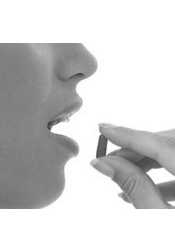Odan Dexamethasone elixir
This product is manufactured by Odan Laboratories Ltd. using the ingredient dexamethasone.
This product is taken orally.

play
orally
Why is it prescribed?
Dexamethasone is used to treat and relieve symptoms of different respiratory disorders (e.g. asthma, COPD). Dexamethasone is also used for many other disorders and diseases but this material will be limited to the respiratory tract.
Dexamethasone should be used exactly as directed by your doctor. Store this medication at room temperature away from light.
High dose or long term therapy must not be discontinued abruptly; it requires gradual tapering to minimize the "withdrawal effect".
If you have been instructed to taper your therapy and you experience any of the following symptoms during or after discontinuation, you should notify your doctor: loss of appetite, fatigue, nausea, vomiting, weakness, dizziness, weight loss, diarrhea.
At any time during therapy, contact your doctor if you experience unusual weight gain, black tarry stools, vomiting of blood, burning, puffing of the face, muscle weakness, menstrual irregularities, prolonged sore throat, fever, cold or infection.
Take with a meal or snack to lessen the possibility of stomach upset.
If you have been instructed to take a single daily or alternate day dose, it should be taken in the morning. The body's natural production of steroids is at a maximum between 2 and 8 am so by taking dexamethasone tablets around this time allows the body to cope better. However, if you have been instructed to take multiple doses, they should be taken at evenly spaced intervals throughout the day.
Alternatives
Other products that have the same ingredient as Odan Dexamethasone elixir are •Apo-dexamethasone tablets •PMS-Dexamethasone tablets and elixir •
See other products used in the treatment of •allergies •asthma •sinus infections •tonsilitis •chronic bronchitis (COPD) •
General anti-inflammatory dosing - Pediatric: 0.08 to 0.3 mg/kg/day in divided doses every 6 to 12 hours
Asthma exacerbation: Infants, Children, and Adolescents: 0.6 mg/kg once daily as a single dose or once daily for 2 days; maximum dose: 16 mg/dose; single dose regimens as low as 0.3 mg/kg/dose and as high as 1.7 mg/kg/dose have also been reported. Note: Duration >2 days is not recommended.
Dexamethasone belongs to the group of medications known as corticosteroids. It is similar to prednisone in it's actions. Dexamethasone has strong anti-inflammatory effects and can be used to treat many different conditions (such as asthma) where inflammation is involved.
Along with its needed effects, dexamethasone may cause some unwanted or undesirable effects. The frequency and severity of these effects is dependant on many factors including dose, duration of therapy and individual response. Your pharmacist will be able to tell you which ones will be more likely to occur with your particular treatment plan. Possible unwanted effects include:
- nausea
- upset stomach
- vomiting
- increased appetite
- weight gain
- bloating
- sleep disturbances
Uncommon:
- fluid retention
- higher blood sugar levels
- increased risk of infection
- impaired wound healing
- peptic ulcers
Rare:
- growth retardation in children (prolonged treatment at anti-inflammatory doses)
- Cushing's Syndrome (long-term use): Appearance of "moonface"(facial rounding); enlargement of some fat pad areas; obesity in the midsection; diabetes; osteoporosis; acne; excessive body hair growth; muscle weakness
- withdrawal effect, if therapy is discontinued abruptly (nausea, fatigue, lowered blood pressure, joint and muscle aches, fever, dizziness, fainting)
- muscle weakness
- glaucoma
- cataracts
- mental disturbances
High dose or long term therapy must be withdrawn gradually (tapered).
While taking dexamethasone, signs of infection can be masked and new infections may appear.
Diabetics may need to increase their dose of insulin or oral diabetes medications.
Dexamethasone can cause mental or mood disturbances (e.g. depression).
Drug Interactions: It is important to tell your doctor and pharmacist of any over-the-counter or prescription medications you are taking. The dose of one or both medications may need to be altered or a new medication may need to be prescribed. The following drugs and drug classes have been known to interact with dexamethasone:
- barbiturates (e.g. phenobarbital)
- phenytoin (e.g. Dilantin®)
- rifampin (e.g. Rifadin®)
- vaccines
- ketoconazole
- nonsteroidal anti-inflammatory drugs (e.g. Aspirin®)
- warfarin (e.g. Coumadin®)
- antidiabetic agents (e.g. insulin)
- cyclosporine (e.g. Neoral®)
- digoxin
- isoniazid
Your pharmacist will be able to answer any questions you may have regarding the seriousness or the mechanism of the interaction
Use is not recommended in the following situations:
- allergy to dexamethasone or any component of the preparation
- fungal infections
- tuberculosis
Caution is recommended in the following situations:
- high blood pressure
- diverticulitis (inflammation of the sacs or pouches that are formed at weak points in the wall of the colon causing abdominal pain with diarrhea or constipation)
- peptic ulcers
- herpes simplex in the eye
- kidney disease
- liver disease
- psychiatric conditions
- myasthenia gravis
- osteoporosis
- hypothyroidism
- ulcerative colitis (inflammation of the colon causing symptoms like diarrhea with or without blood and mucus, and lower abdominal pain)
Use in pregnancy: Dexamethasone may pose a small risk to the developing fetus. Consult your doctor or pharmacist if you suspect that you may be pregnant.
Use while breastfeeding: Short-term use is considered safe. Limit dose and duration of therapy, when possible.
